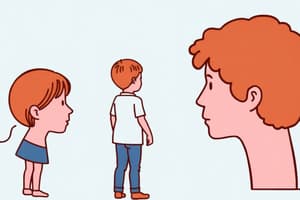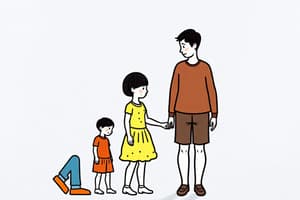Podcast
Questions and Answers
What is the essence of Erikson’s 7th stage of development, Generativity versus Stagnation?
What is the essence of Erikson’s 7th stage of development, Generativity versus Stagnation?
- A sense of accomplishment and productivity (correct)
- Facing the loss of personal identity
- The need for social acceptance and friendship
- Feeling unproductive compared to peers
Which of the following best describes fictive kin?
Which of the following best describes fictive kin?
- A close friend with whom one shares a family bond
- A relative linked by marriage
- A family member that is genetically related
- Someone who provides support similar to family but is not related by blood or marriage (correct)
What is one of the consequences of unemployment according to Erikson’s theory?
What is one of the consequences of unemployment according to Erikson’s theory?
- Higher likelihood of experiencing stagnation (correct)
- Increased sense of generativity
- Greater personal satisfaction
- Enhanced familial relationships
What adjustment might be necessary for parents during the parenting stage of Erikson's development?
What adjustment might be necessary for parents during the parenting stage of Erikson's development?
In what way can employment fulfill the need for generativity?
In what way can employment fulfill the need for generativity?
What does Erikson’s stage of Intimacy vs Isolation primarily focus on?
What does Erikson’s stage of Intimacy vs Isolation primarily focus on?
Which of the following is NOT part of the Big Five personality traits?
Which of the following is NOT part of the Big Five personality traits?
What does Maslow's Hierarchy of Needs suggest about personality development?
What does Maslow's Hierarchy of Needs suggest about personality development?
According to Erikson, what is the consequence of failing to resolve the stage of Intimacy vs Isolation?
According to Erikson, what is the consequence of failing to resolve the stage of Intimacy vs Isolation?
In Trait Theory, how is personality best described?
In Trait Theory, how is personality best described?
Which stage follows Intimacy vs Isolation in Erikson's psychosocial development?
Which stage follows Intimacy vs Isolation in Erikson's psychosocial development?
What is a key characteristic of individuals who achieve the stage of Generativity vs Stagnation?
What is a key characteristic of individuals who achieve the stage of Generativity vs Stagnation?
Which of the following describes the need for intimacy according to Erikson?
Which of the following describes the need for intimacy according to Erikson?
What is one of the primary advantages of marriage?
What is one of the primary advantages of marriage?
According to the Triangular Theory of Love by Sternberg, which of the following elements is NOT included?
According to the Triangular Theory of Love by Sternberg, which of the following elements is NOT included?
What is a common preference for many people as an alternative to marriage?
What is a common preference for many people as an alternative to marriage?
Which statement accurately describes 'Living apart together'?
Which statement accurately describes 'Living apart together'?
How do friendships contribute to well-being over time?
How do friendships contribute to well-being over time?
Which statement reflects the role of family in social relationships?
Which statement reflects the role of family in social relationships?
What factor often leads to the deterioration of sibling relationships?
What factor often leads to the deterioration of sibling relationships?
What is one characteristic of adults in a social convoy?
What is one characteristic of adults in a social convoy?
Flashcards
Personality
Personality
A unique and consistent pattern of thinking, feeling, and behaving that develops over a person's life.
Erikson's Stages of Psychosocial Development
Erikson's Stages of Psychosocial Development
A theory that proposes individuals face eight stages of psychosocial crises throughout their lifespan, each requiring resolution for healthy development.
Intimacy vs. Isolation
Intimacy vs. Isolation
The sixth stage of Erikson's theory, focused on developing close and meaningful relationships with others. Failure to achieve intimacy leads to isolation.
Maslow's Hierarchy of Needs
Maslow's Hierarchy of Needs
Signup and view all the flashcards
Trait Theory
Trait Theory
Signup and view all the flashcards
The Big Five
The Big Five
Signup and view all the flashcards
Generativity vs. Stagnation
Generativity vs. Stagnation
Signup and view all the flashcards
Ego Integrity vs. Despair
Ego Integrity vs. Despair
Signup and view all the flashcards
Fictive Kin
Fictive Kin
Signup and view all the flashcards
Generativity
Generativity
Signup and view all the flashcards
What is the 'mid-life crisis'?
What is the 'mid-life crisis'?
Signup and view all the flashcards
Caregiving
Caregiving
Signup and view all the flashcards
Impact of Unemployment
Impact of Unemployment
Signup and view all the flashcards
Intimacy Needs
Intimacy Needs
Signup and view all the flashcards
Advantages of Marriage
Advantages of Marriage
Signup and view all the flashcards
Triangular Theory of Love
Triangular Theory of Love
Signup and view all the flashcards
Cohabitation
Cohabitation
Signup and view all the flashcards
Living Apart Together (LAT)
Living Apart Together (LAT)
Signup and view all the flashcards
Social Convoy
Social Convoy
Signup and view all the flashcards
Linked Lives
Linked Lives
Signup and view all the flashcards
Impact of Family on Life
Impact of Family on Life
Signup and view all the flashcards
Study Notes
Adulthood: The Social World
- Overview: This chapter focuses on the social and personality development of adults.
- Personality Development: Adults develop unique and consistent patterns of thinking, feeling, and behaving throughout life.
- Three Perspectives: Personality development can be viewed through these three perspectives:
- Erikson's Stage Theory: Explores psychosocial stages and challenges faced by adults like Intimacy vs Isolation and Generativity vs Stagnation
- Maslow's Hierarchy of Needs: Motivated by a hierarchy of needs from basic physical needs to self-actualization.
- Trait Theory: Views personality as a unique combination of traits (e.g., openness, conscientiousness, extroversion, agreeableness, neuroticism).
- Erikson's Final Stages:
- Intimacy vs Isolation: Focuses on developing close relationships.
- Generativity vs Stagnation: Characterized by feelings of productivity and contributing to society.
- Ego vs Despair: Final stage reflecting on one's life.
Intimacy (Relationships)
- Romantic Partnerships: Common for romantic relationships to lead to marriage. Advantages include increased happiness, health, and financial well-being.
- Romantic Love: Sternberg's triangular theory of love includes passion, intimacy, and commitment.
- Alternatives to Marriage: Cohabitation (living together) is a common alternative in various life stages.
Other Important Relationships
- Friendships: Friends play a crucial role in offering support, encouragement, and guidance.
- Family Relationships: Family bonds, particularly those with siblings and parents, maintain significance throughout life.
- Fictive Kin: Non-blood relatives who become important family figures.
Caregiving and Employment
- Caregiving: Providing care is a significant source of generativity, fulfilling the need to be needed.
- Employment: Work can be a source of generativity, particularly if it involves aiding others or contributing to society. Unemployment is linked to negative outcomes.
Parenthood
- Raising children is a common and natural source of generativity.
- Adjustments and challenges related to finances, intimacy and other life changes often accompany parenthood.
Studying That Suits You
Use AI to generate personalized quizzes and flashcards to suit your learning preferences.
Related Documents
Description
Test your knowledge on Erik Erikson's 7th stage of development, Generativity versus Stagnation. This quiz will explore key concepts such as fictive kin, impacts of unemployment on development, and parental adjustments during this stage. Dive into the essence of generativity and its fulfillment through employment.




